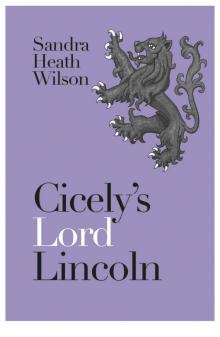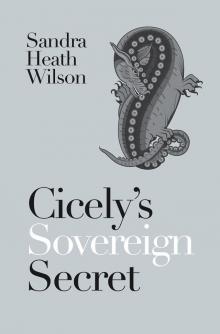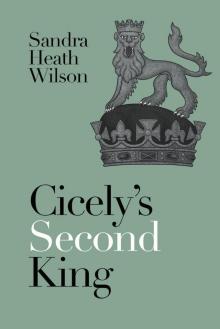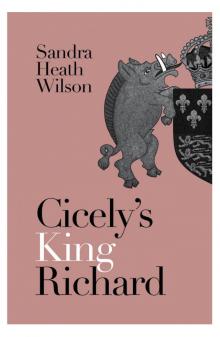- Home
- Sandra Heath Wilson
Cicely's Sovereign Secret
Cicely's Sovereign Secret Read online
Cicely’s
Sovereign
Secret
A Story of King Henry VII’s Private Matter
Sandra Heath Wilson
Contents
Preface
Chapter One
Chapter Two
Chapter Three
Chapter Four
Chapter Five
Chapter Six
Chapter Seven
Chapter Eight
Chapter Nine
Chapter Ten
Chapter Eleven
Chapter Twelve
Chapter Thirteen
Chapter Fourteen
Chapter Fifteen
Chapter Sixteen
Chapter Seventeen
Chapter Eighteen
Chapter Nineteen
Chapter Twenty
Chapter Twenty-One
Chapter Twenty-Two
Chapter Twenty-Three
Chapter Twenty-Four
Chapter Twenty-Five
Chapter Twenty-Six
Chapter Twenty-Seven
Chapter Twenty-Eight
Author’s Note
Preface
In the spring of 1483, the children of the late Yorkist King Edward IV were declared illegitimate by their own uncle, the new King Richard III. His second niece, the perceptive and loyal Cicely Plantagenet, hardly knew him, but from the outset was fiercely drawn to this charismatic man, with whom she shared tremendous affinity and, rarest of all, his trust.
With Richard, Cicely discovered her intensely passionate nature, and how honourable and sensitive he was. They were uncle and niece—forbidden to succumb to desire—but they shared complete, unconditional but secret love before Richard had to defend his realm, his cause and his life against the invading force of the Lancastrian pretender, Henry Tudor.
Richard was slain at the Battle of Bosworth Field on 22 August 1485, and his death left Cicely grief-stricken, alone, and carrying his child. He was to be branded a wicked tyrant, but she knew the true man, and defended his memory, even to Henry Tudor’s face. Her love for Richard would never be shaken, no matter how strenuously and cleverly his conqueror sought to ruin his good name.
Clinging to her lost love, and anxious for her unborn child, Cicely found herself ensconced in the court of the Lancastrian usurper, whom she did not regard as fit to aspire to Richard’s throne. Henry was ruthless, cold, dangerous and enigmatic, and Cicely’s bitter elder sister, Bess, had become his unwanted, hate-filled queen.
About to be shamed and ruined by bearing an illegitimate child, Cicely was saved by Henry’s half-uncle, Jon Welles, who offered marriage and acknowledged Richard’s child as his own. It commenced as a contract, but became much more, although what she felt for Jon could not compare with the powerful emotion aroused by Richard.
Henry was not as cold as he seemed, but harboured a suppressed passion for Cicely, the sister he could not have. He was determined to possess her, and forced her into his bed with threats to harm those she loved. Cicely loathed Henry for Richard’s death, but his serpentine charm, vulnerability and surprising skills as a lover often made hating him impossible.
Throughout, she knew he was a mortal threat to her secret son, to Jon, and to all Yorkists, especially her adored cousin, Jack (John) de la Pole, Earl of Lincoln, who was accepted to have been Richard’s heir. While she and Jon were estranged, she and Jack became lovers, and she gave him her heart. He became the second great passion of her life.
To Cicely, Jack was the rightful King of England, but then in the summer of 1487 he became embroiled in a plot to put a pretender called Lambert Simnel on the throne of England. Through Jack she was lured into dangerous plots and secrets of which Henry would dearly have liked to learn. Her anxiety for her charming, irresistible cousin grew daily, because the affinity she shared with him was an echo of that shared with Richard.
The Simnel rebellion wrought havoc in the realm, with Henry emerging the victor. Jack was believed to have been killed in battle, but Cicely rescued him. Henry suspected that the body he buried on the battlefield with a willow stave through its heart was not that of the Earl of Lincoln.
The last Cicely saw of her cousin and lover was on the river stairs at Westminster Palace, with his inscrutable accomplice, the older Welshman known to her only as Tal. It was a cold winter night, with fluttering torches and falling snow, and Jack’s farewell smile had been so beloved in the streaming flames and leaping shadows.
She did not know if she would ever see him again, but she did know that Henry still ruled her life and that he was closing in upon her little boy. Would she ever be free of him?
Chapter One
It was Christmas, and the night air cracked with cold as two well-muffled horsemen rode the final snowy mile towards Knole, the Kent palace of the Archbishops of Canterbury.
One rider was the Lancastrian king, Henry VII, perhaps the most calculating and devious monarch to ever rule England; and one of the luckiest and least deserving. A month short of his thirty-first birthday, tonight he was pursuing a very delicate and dangerous private matter. His companion was the only man in whom he had confided, and that only partially. If the whole truth came out, there would be renewed and widespread rebellion, even within his own ranks, and the hitherto defeated House of York would surely reunite and overthrow him. It was vital to him that this private matter remained just that—private.
Knole was in darkness, in the hands of a few of Henry’s most trusted servants. Not even Archbishop Morton himself was there, knowing better than to question the dangerous usurper he himself had conspired to put on the throne.
Two of Henry’s Yorkist foes were also waiting covertly. One was the Plantagenet prince he had cause to fear the most, the other he would have been dismayed to identify. Purely by chance, they had wind of the sensitivity of the meeting, and hoped to learn all they could. To them the thirty years of war between York and Lancaster were far from over, and it was their goal to remove Henry from the throne he had usurped through the betrayal and death of the Yorkist king, Richard III.
A bribed servant had left a ground-floor casement unfastened, and now the intruders waited at a small-paned upper window overlooking the quadrangle. They wore black, and their faces were smeared with soot, making them impossible to see in the unlit passage, where the tapestries and Christmas greenery were shadowy. Several torches flickered below, and a lantern shone beneath the gatehouse to their left. To their right was the roofed, columned gallery that sheltered two entrances to the great hall, where Henry’s secret would surely be revealed. The Yorkists certainly prayed so.
The more important of the two was 25-year-old Jack de la Pole, Earl of Lincoln, Richard III’s trusted nephew and intended heir, who was believed to have died in battle against Henry during the summer. But Henry knew of his secret survival, and hunted him doggedly. Everything about Jack told of strength, courage and purpose, coupled with an appeal that won men to his banners. With tumbling, almost black curls and dark, shining eyes, he was more handsome and alluring than was good for the wellbeing of the fair sex, with whom he had seldom failed.
His older companion, identified only as Tal, was in his early fifties, a fit and rugged man, fair-haired and of noble birth. The scent of cinnamon lingered around him, suggesting far warmer lands than the Welsh borders from which he hailed. Strangely, the large, orange-gold topaz ring he always wore seemed to suggest the same thing. Perhaps because it brought the sands and heat of the desert to mind.
Both were nervous, but Tal truly doubted the wisdom of tonight’s venture, even though Knole was virtually empty. ‘Diawl, Jack, this is bloody madness.’
‘All I need is for you to identify the boy. If he comes.’
‘I only glimpsed him on a windy night on a French quay! That is all.’
Jack was irritated. ‘You are our chance of making this identification. If the boy we expect tonight is the same one watching when Henry left to invade England two years ago, then surely our suspicions are confirmed.’
‘I still cannot provide proof, Jack. The fellow who sent word to us in the first place is dead at the hands of Henry’s toads, and although I paid that priest well, half then, the other half depending on result, he clearly played me for a fool. I have sent a trusted man back into Brittany, but it will take time. I have no idea yet who the woman was, except perhaps the boy’s mother.’
There were sounds from the gatehouse end of the passage, a door opening and men’s voices. They must have been outside, because they stamped their boots and cursed the cold. Jack and Tal also heard whining and the slither of large paws on a wooden floor.
‘Shit! One of the mastiffs!’ Jack glanced at a nearby door. ‘In there! Quick!’
Tal needed no urging, and they slipped swiftly out of sight, but before closing the door, Jack took a phial from his purse, and smeared some of the contents down the jamb.
Then, the door closed, he and Tal pressed back against the wall, daggers drawn. They hardly dared to breathe as the men and the hound approached, still complaining and stamping their feet occasionally.
Jack crossed his fingers superstitiously as the hound began to whine within inches of the door.
One of the men noticed. ‘What is it, Nero?’
The hound suddenly sneezed and the men laughed. ‘Come on, you useless cur!’ one said, and to the intruders’ relief, Nero left willingly enough as the men moved on.
Jack straightened from the wall. ‘That was too fucking close.’
‘What did you put on the door?’
‘Orange oil. Many dogs do not like it. We struck lucky with Nero, blessings be upon him! He may have picked us up, but the oil spoiled his sense of smell.’
Tal opened the door cautiously, and peered out. Everything was as it had been, and he emerged slowly, sheathing his dagger. ‘If we had any sense, we would leave now, while we know we can.’
‘We must learn Tudor’s secret.’ Jack put his dagger away as well. ‘Tell me again what you remember about the boy.’
‘Well, I would say he is an arrogant, sulky brat. He seemed about twelve, so will be at least fourteen now. The woman kept him close. She was pale, and looked unwell to me, but beautiful and probably older than Henry.’
‘With whom she had no fond leave-taking?’ Jack pressed.
‘Not a sign of it. Our only facts are that she and the boy were there, and Henry was of intense interest to them.’
‘Yet, we expect the boy to come here tonight. There is much more to this than appears on the surface, but God alone knows what. Royal by-blows are common enough.’ Jack had been puzzled from the outset.
‘Henry’s purpose tonight might be some other Tudor nonsense.’
‘Henry does not deal in nonsense,’ Jack replied quietly.
Tal grunted. ‘He is unbalanced, like a door on one hinge.’
‘Only sometimes. As to the boy … we only have to observe and then leave as secretly as we came.’
A rafter creaked, and both men stiffened, but then there was silence again. Tal breathed out slowly. ‘Sweet God, we perceive danger in everything.’
‘The day we do not, will be the day we are snuffed.’
‘Then I trust you hear its soft steps when you dally with the queen’s sister.’
Jack smiled too. ‘Ah, my sweet, sweet Cicely. No wonder Henry thinks he married the wrong sister. His queen mishandles him quite amazingly.’
‘Whereas Viscountess Welles handles him most deftly, from all accounts.’ Tal grinned. ‘And if it were known she also has you to handle deftly as well, she would be envied by English womanhood.’
Jack chuckled. ‘Henry despises me because of her, almost more than my Yorkist blood. He will never win her.’
Tal studied him. Jack de la Pole seemed to be just a likeable rogue, but was discreet, perceptive, clever and unshakably loyal to his House. There was no doubt that had he succeeded Richard III, he would have been a worthy king, and far more popular than Henry Tudor could ever be. Tal felt more than loyalty to Jack, he felt paternal love, too.
He was taller than Jack, and muscular, without the extra weight that so often accompanied age. His shrewd eyes were green, and his long fair hair liberally streaked with grey, a true blend of salt and pepper. Bowing to the vagaries of fashion had never been his way, and he made a point of always being in need of a good shave. He was inscrutable, with hidden depths and unshakeable resolve. As well as an air of being revenge personified.
Not sensing the scrutiny, Jack pulled a philosophical face. ‘I have Cicely, but must share her with her husband and her snake of a brother-in-law. Her husband I can endure, not least because I like and respect him. Jon Welles may be Henry’s half-uncle, but he would have brought his 10,000 men over to me at Stoke in the summer. I would not have lost the battle then. But Henry Tudor I detest. More than I ever imagined possible.’
Tal glanced at him, about to say something but then thinking better of it.
Jack read him well. ‘The Seventh Commandment? Well, we cannot all be as saintly as you, Tal. Censure me, by all means, and Tudor, but think ill of my lady at your peril, for I will not allow it, even from you. She is Tudor’s lover because he blackmails her by threatening those she loves, to wit, her husband and me. Tudor is obsessed with her, do you not see it? She may only be eighteen, but she is a rare creature, so warm, excitingly carnal and pleasing that men adore her. Her husband certainly does, and so do I. She has a great heart, and has always loved truly, beginning with—’ He stopped. ‘Well, it matters not with whom it began. There is a magic about her, and saint or not, even you must have imagined being in her bed.’
‘Do not misunderstand me, Jack. I hold Lady Welles in great esteem. My unspoken comment was to wish you could both be free to marry.’
Jack always found him perplexing. ‘Where is your wife now? Kingston l’Isle or Calais?’ He called it Callis, as did most Englishmen.
‘Neither. I have sent her to my sister at Kenninghall, where she is now more holy than the Virgin herself, and even dresses as if in Holy Orders.’
‘Good God.’
‘We all, men and women alike, take a chance with marriage. Sometimes we are fortunate, but other times we have the Devil to thank. I have Woden to thank.’
Jack stared. ‘Woden?’
‘Oh, pay no heed. It is all nonsense. Jack, I am sorry if you thought I disapproved of you and Lady Cicely. Broken marriage vows are a particularly sensitive subject for me. And not because of my own marriage, as I think you know well.’
Jack’s expression changed, and he clapped a reassuring hand on the older man’s shoulder. ‘Yes, I know. And understand.’
‘My feelings run too high sometimes.’ Tal was rueful.
‘As when you drink your sorrows to drive them away, only to make them worse? Too much wine does you no good, Tal.’
‘You know it seldom happens. I usually drink sparingly.’
Jack clapped his shoulder again, and then they looked down into the quadrangle in silence, before Tal asked, ‘When will Tudor arrive, I wonder?’
‘Any time now,’ Jack replied. ‘The secretary in the great hall began to pace an hour ago.’
‘Who do you think he will bring?’
‘There are few he dares to trust.’
The clatter of hooves echoed suddenly into the courtyard, and Jack smiled grimly. ‘He must have heard us, God rot his innards. And only one companion?’
‘They are both so muffled I cannot make anything out, even which is which.’
‘Henry is on the roan. I would know the dragon of Cadwallader a mile away at night, hooded, in black on a black mount.’ He watched closely as the riders reined in and grooms ran to tend the sweating horses.
/> Henry swung a leg over his pommel to jump down to the snow. He was tall, slender and graceful, and did not remove his hood, but the face of the second man was suddenly revealed in the dancing torchlight.
Jack was startled. ‘Sweet Jesu! Jon Welles!’
Dismayed, he gazed down at Cicely’s husband. Jon, Viscount Welles was in his late thirties, an impressive man with long legs and a firm frame. He was clean-shaven, with carved features, and his wiry brown hair was greying at the temples. His eyes, Jack knew, were a particularly vivid, penetrating blue.
Jack did not know what to think. Henry was suspicious of his half-uncle’s failure to arrive in time at Stoke Field, so why in God’s own name trust him with a matter that was self-evidently dangerous and sensitive?
Tal watched the two men exchange words. ‘I thought Welles was one of us now.’
‘So did I. His force would have been decisive.’
‘If he ever intended to fight. Maybe he prefers to wait and see.’
Jack shook his head. ‘No, he was honestly delayed.’
‘Well, he appears to be Henry’s man again now.’
The two men disappeared beneath the gallery towards the great hall, and Tal nudged Jack. ‘Come, to our purpose then, and God protect us.’
‘Amen to that.’
They moved stealthily towards the stairs that led down to the ground-floor lobby. From there an egress opened straight in front of them to the quadrangle gallery, and to their left was a door into an identical passage beneath the one they had just quit. It was in a room at the far end of this second passage that the casement through which they had gained entry was to be found.
To the right of the lobby was a short, narrow way to the wedged-open door of the firelit great hall. The two men crept silently towards it, alert for any sign of guards or mastiffs. They halted by the doorway, which was next to the dais that elevated the archbishop and his guests above others. The long, white-clothed trestle table concealed the interlopers from those by the fireplace halfway down the hall. Henry and Jon talked in low voices as they stood before flames and crackling logs. A small table and a chair had been placed in readiness.
The diminutive secretary—white-haired, bearded and clad in dark robes—hovered uneasily by the table, where several documents were in readiness for Henry’s signature and seal. Sticks of sealing wax were there too, one of them bright yellow. Jack and Tal had been told that the unidentified woman on the quay at Honfleur always used yellow sealing wax, and had sent Henry an enigmatically forged letter. It contained nothing more than the briefest of appeals for help, but his shocked reaction had been witnessed by Cicely and Jon Welles.

 Cicely's Lord Lincoln
Cicely's Lord Lincoln Cicely's Sovereign Secret
Cicely's Sovereign Secret Cicely's Second King
Cicely's Second King Cicely's King Richard
Cicely's King Richard